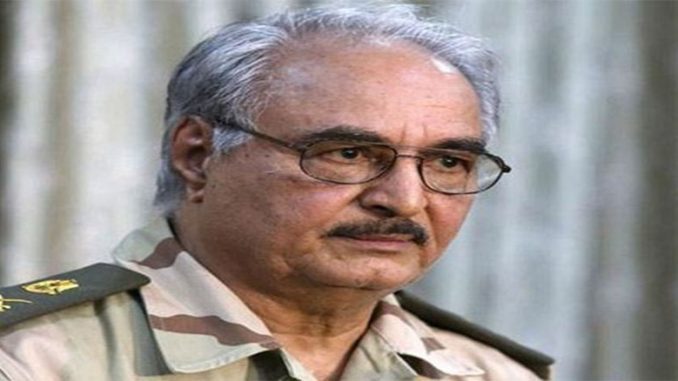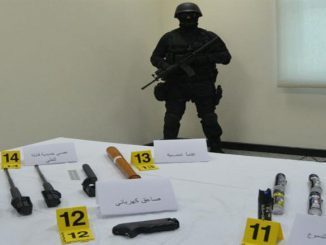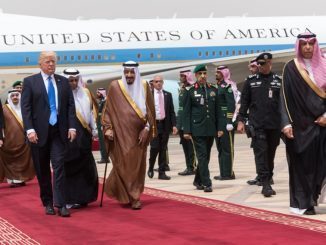
U.S. officials appealed to a renegade Libyan commander in recent talks to forgo what they said would be a destructive offensive into the capital, Tripoli, a senior official said, signaling the Trump administration’s heightened focus on Libya, according to the Washington Post.
Meanwhile Turkey’s President Recep Tayyip Erdogan has reportedly urged end to Hafter’s attacks.
The unusual interaction between a high-level delegation led by deputy national security adviser Victoria Coates and Khalifa Hafter, who has accrued power in the years following the ouster of dictator Moammar Gaddafi, occurs as his forces press a months-long assault aimed at cementing control of western Libya.
“The message to General Hafter was very clear, that we feel a military incursion into Tripoli would be disastrous right now, or ever,” said a senior US administration official who spoke on the condition of anonymity to characterize the closed-door discussions, reported the Washington Post.
At least 200 civilians are believed to have been killed since Hafter’s forces launched an operation in April against the U.N.-backed Government of National Accord (GNA) in Tripoli. The offensive has triggered an increase in foreign weaponry pouring into Libya in support of the two warring sides and exposed divisions within the Trump administration.
The State Department did not disclose the location of the meeting but said it occurred Sunday in the Middle East region. The talks also included Richard Norland, the U.S. ambassador to Libya; Matthew Zais, a senior Energy Department official; and Brig. Gen. Steven deMilliano of U.S. Africa Command.
For years, the United States had taken a clear position of support for the GNA, which was created in 2015 as part of U.N. efforts to broker a deal to end Libya’s de facto partition, rather than other actors vying for legitimacy. That stance has been complicated by the GNA’s inability to rein in militias in the areas it controls and, more recently, by what has appeared to be President Trump’s affinity toward Hafter’s cause.
A call between Trump and Hafter in early April, shortly after Hafter launched his offensive, appeared to provide evidence of that shift, giving Hafter a boost at a time when he has been seeking international validation. The call angered officials from the GNA, who viewed it as a betrayal.
Even before then, American officials had gradually shown more openness to Hafter, who has amassed a formidable arsenal with help from the United Arab Emirates, Russia and other countries, and who has sought to claim a mantle of effectively handling extremists in eastern Libya. But up to now, interactions between U.S. officials and Hafter have occurred in a lower-level, low visibility way.
U.S. officials in Washington have rebuffed efforts by individuals linked to Hafter to arrange a Washington visit for him in recent months.
The GNA has also received military support from Turkey in an apparent violation of a U.N. arms embargo.
The senior administration official said Hafter, “in many ways,” had achieved his objectives, raising the profile of several complaints that include the distribution of state revenue and a “militant component of the militias in Tripoli.”
Germany is leading an effort to hold a political summit on Libya to breathe new life into a U.N. process.
“Our goal is to figure out how to get those problems resolved, so we don’t have a really problematic intervention,” the official said.
While Libya has not been the Trump administration’s foreign policy priorities, an apparent expansion of Moscow’s role there has galvanized attention in Washington. Military officials say Russian troops and mercenaries, at least some of them affiliated with Kremlin-linked security firm Wagner, have provided on-the-ground support to Hafter.
The official said the United States had asked Libyans to find ways to reduce the violence and had stressed to Hafter the “very negative potential” outcomes from Russian involvement.
Speaking to reporters at the State Department on Tuesday, David Schenker, assistant secretary of state for Near Eastern Affairs, said the Trump administration had asked European countries to take steps to designate or sanction Wagner.
Hafter “controls some 80 percent of the territory of the country right now, although certainly a much smaller percentage of the population, but has armor and significant forces under his control,” Schenker said. “We remain engaged at the highest levels, and that means we do talk to Hafter.”
The official said the U.S. delegation also highlighted the need for steps toward “free, fair and meaningful” elections.
Asked about reports of divisions between the State Department, which has voiced consistent support for the GNA, and the White House, which is seen as more open to Hafter, the official said: “I don’t see a Hafter solution; I don’t see a GNA solution; I see a Libyan solution.”
Erdogan urges end to Haftar attacks
On his part, Turkey’s President Recep Tayyip Erdogan reiterated his country’s support for the internationally recognized government of Libya, as he called on the forces of General Khalifa Haftar to halt their assaults, in a meeting held on Friday with the head of the country’s U.N.-supported government in Istanbul.
During the meeting at the presidential palace, Erdogan highlighted Turkey’s support for the internationally recognized government led by Prime Minister Fayez al-Sarraj. The Turkish president also called on the forces of General Haftar, whose self-styled Libyan National Army lacks any legitimacy, to stop their assault on Libyan capital Tripoli.
Erdogan said he stands by the legitimate Libyan government’s efforts to finally bring peace and stability to the war-torn country. The two leaders also discussed bilateral relations as well as regional situation and developments.
The militia loyal to Haftar took a hostile step against Turkey last week by abducting six Turkish nationals. Having recognized the Government of National Accord, Ankara said it sees the action as banditry, warning that Haftar’s forces will become legitimate military targets if they do not release the Turkish citizens. Following the announcement, the captives were freed.
Turkey and Libya have also signed two memoranda of understandings, the Turkish Presidential Communications Directorate announced Wednesday. “The Security and Military Cooperation” and “Restriction of Marine Jurisdictions” agreements were signed when Turkish President Erdogan held a closed meeting that lasted 2 hours and 15 minutes with Fayez al-Sarraj, chairman of Presidential Council of Libya, at the Dolmabahce Palace in Istanbul. The Directorate said the agreement is an effort to strengthen relations and cooperation between the two countries.



